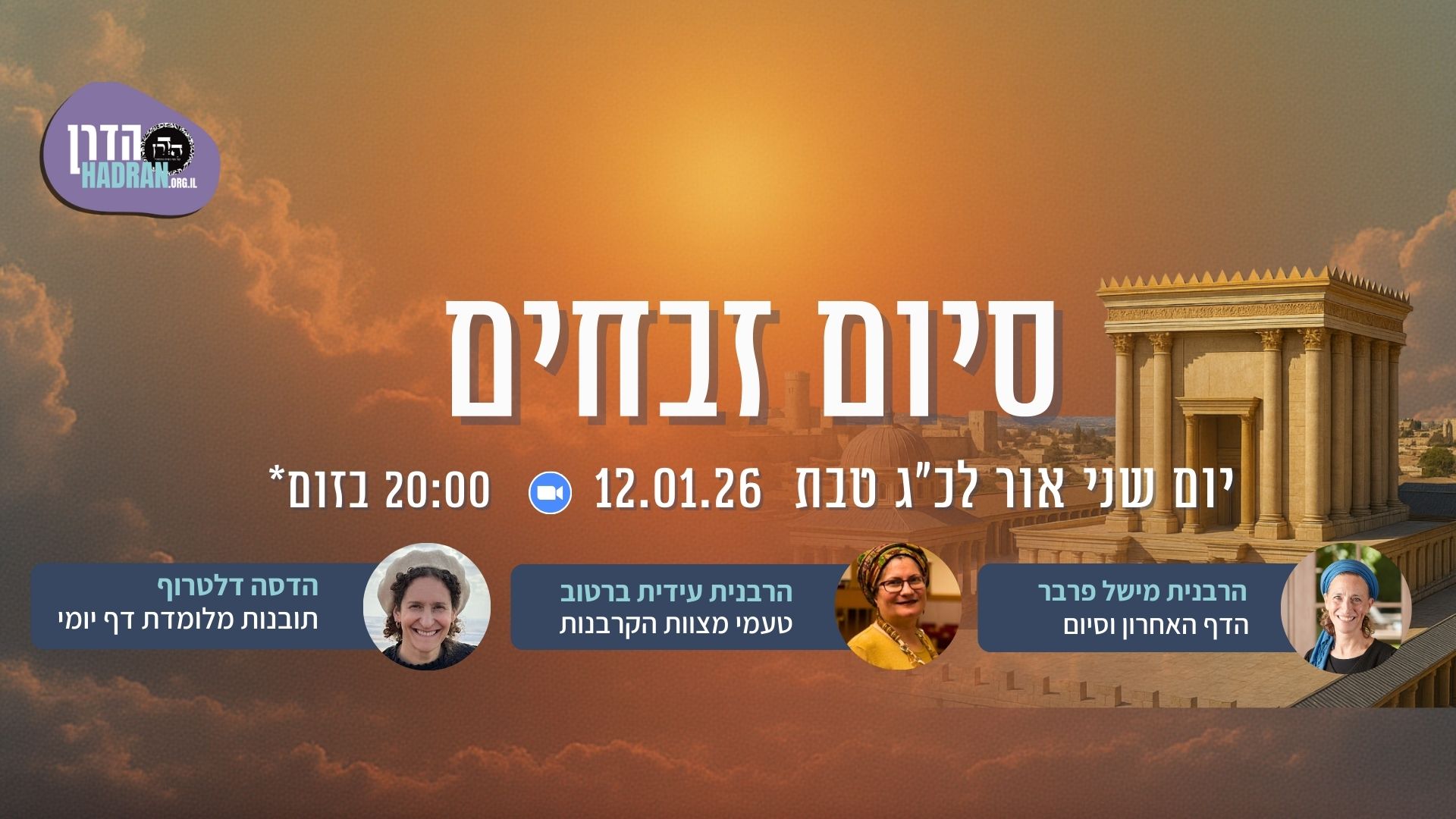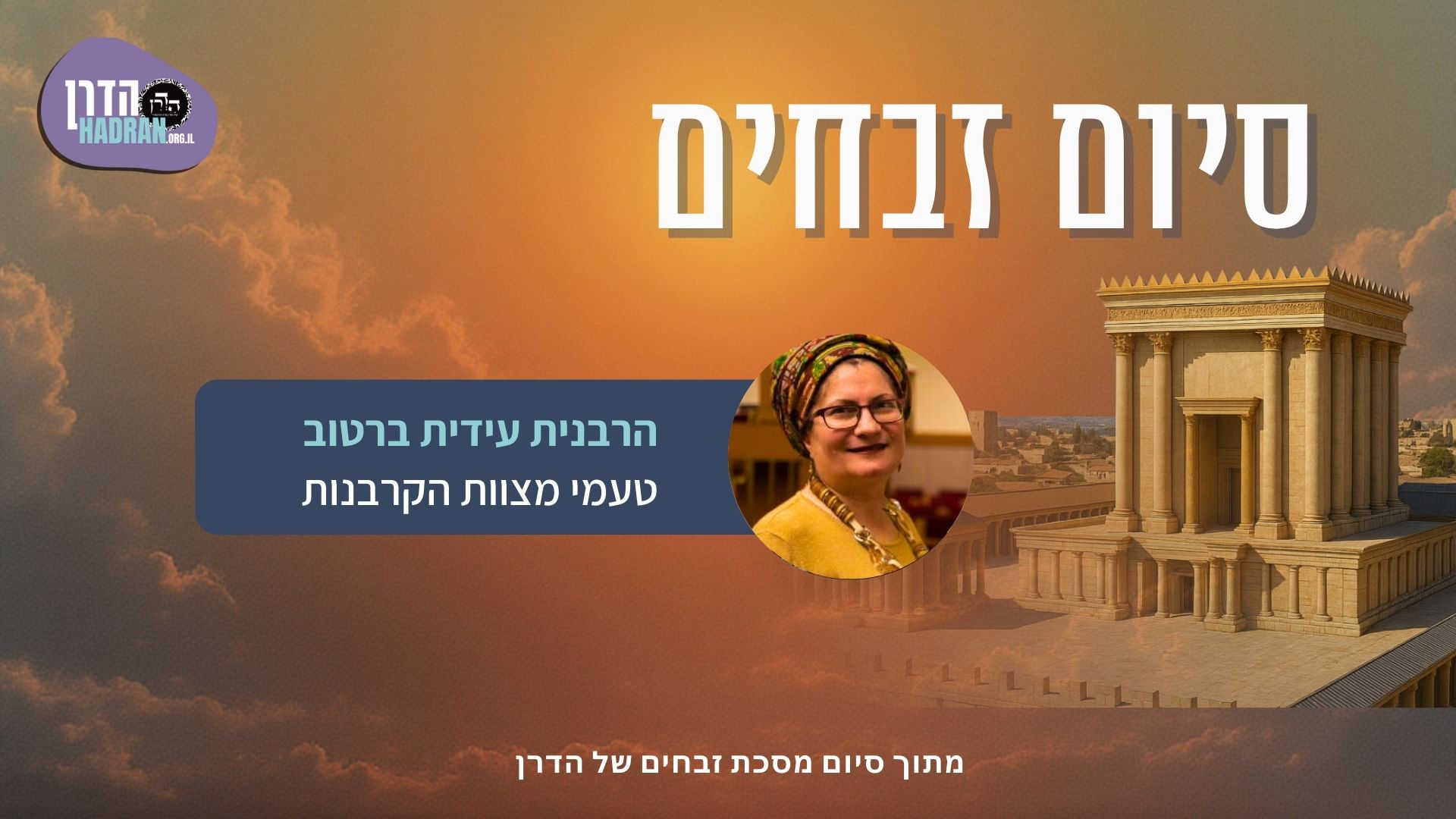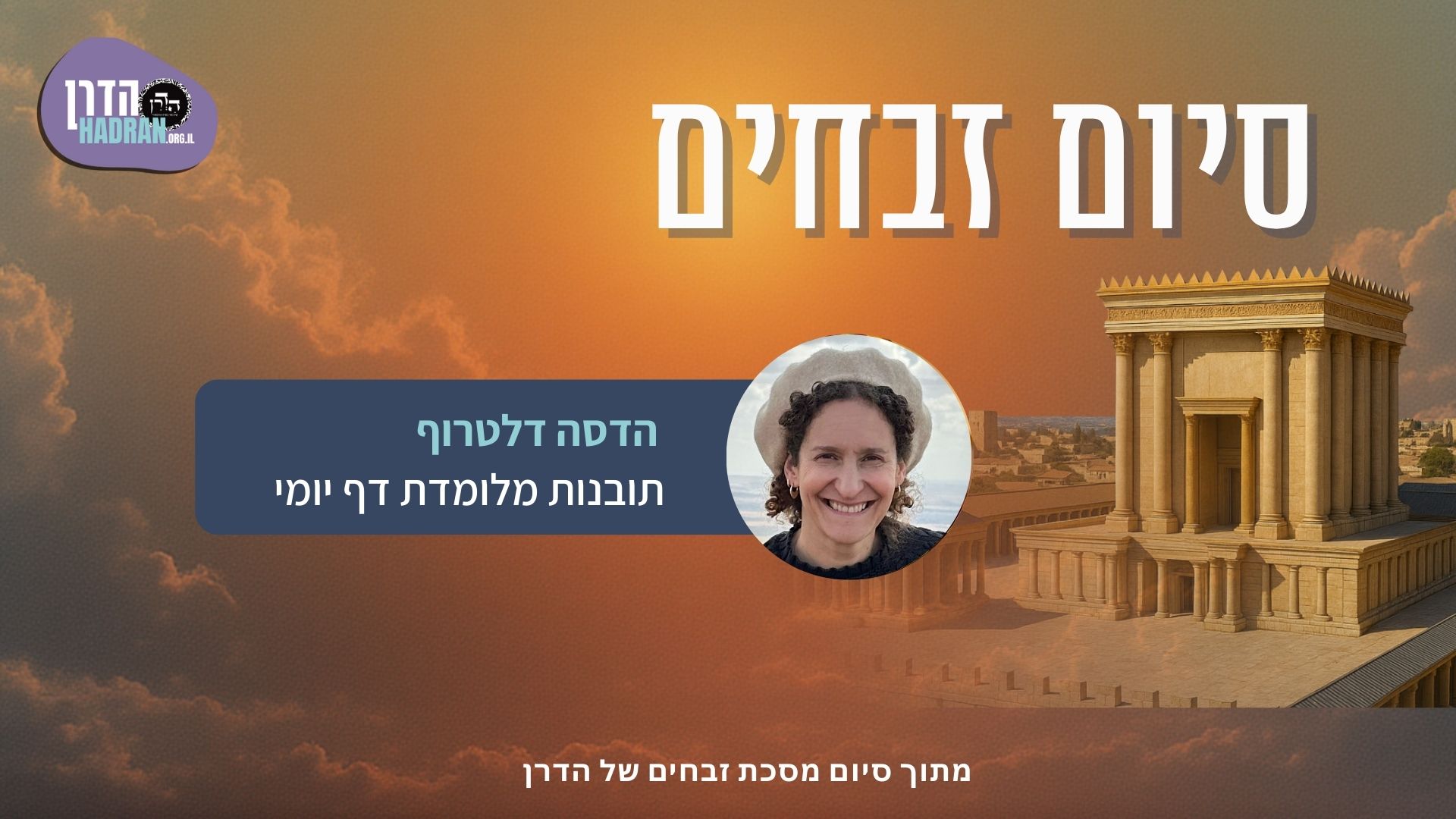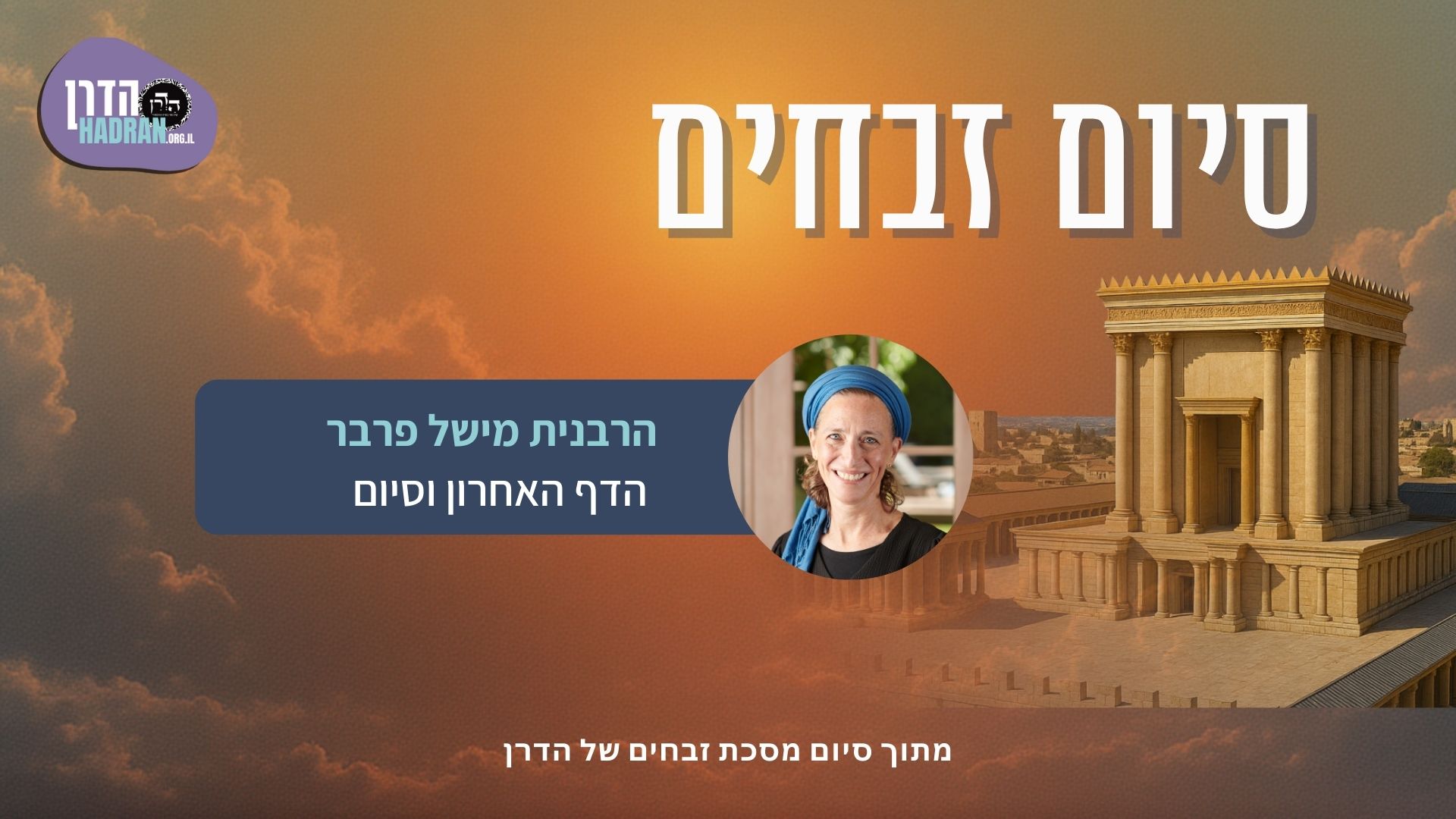מסכת זבחים
מסכת זבחים מוקדש ע”י אסתר קרמר לע”נ אביה מני גרוס.
רוצה להקדיש שיעור?

תקציר
בהמשך לדיון על תגובתו של ריש לקיש לרבי אלעזר, עולה שאלה האם היורשים זוכים בקרבן של מי שנפטר. מובאים מקורות התומכים בשתי העמדות. בסופו של דבר, הגמרא מסיקה שהיורשים אינם זוכים בקרבן, אף על פי שהם עשויים לקבל ממנו מידה מסוימת של כפרה.
שאלה נוספת עולה בנוגע לקרבן שנקרב שלא לשמה – מתוך כוונה לקרבן מסוג אחר. אם הקרבן המקורי עדיין מוקרב, האם הוא מקיים את מטרתו המקורית? ואם לא, מדוע מקריבים אותו כלל? ואם כן, מדוע נדרש קרבן נוסף? רב אשי מבהיר שהקרבן הראשון מוקרב מכוח ייחודו המקורי, ואילו הקרבן השני נדרש כדי להשיג כפרה, במקום הקרבן המקורי.
הגמרא גם דנה בשאלה האם עולה יכולה לכפר על ביטול מצוות עשה בין זמן ההקדשה (ההפרשה) של הבהמה לבין זמן שחיטתה, או רק על מצוות שביטלו לפני ההקדשה. מובאות מקורות בניסיון להכריע את השאלה.
כלים
מסכת זבחים
מסכת זבחים מוקדש ע”י אסתר קרמר לע”נ אביה מני גרוס.
כלים
העמקה
רוצה להבין מה באמת קורה מתחת לפני השטח של הסוגיה?
שיעורים, פודקאסטים והרחבות של מיטב המורות שלנו יפתחו לך עוד זוויות וכיווני חשיבה.
חדשה בלימוד הגמרא?
זה הדף הראשון שלך? איזו התרגשות עצומה! יש לנו בדיוק את התכנים והכלים שיעזרו לך לעשות את הצעדים הראשונים ללמידה בקצב וברמה שלך, כך תוכלי להרגיש בנוח גם בתוך הסוגיות המורכבות ומאתגרות.
פסיפס הלומדות שלנו
גלי את קהילת הלומדות שלנו, מגוון נשים, רקעים וסיפורים. כולן חלק מתנועה ומסע מרגש ועוצמתי.
זבחים ו
וְשׁוּתָּפִין לָא מָצוּ מְמִירִין. אֶלָּא אִי אָמְרַתְּ לָא קַנְיָא לְהוּ – אָמוֹרֵי נָמֵי לִימְרוּ!
and partners cannot effect substitution of other animals for their offering. But if you say that it is not acquired by them, and the animal is the property solely of the deceased father, let them also effect substitution on his behalf, as heirs are able to effect substitution for their deceased parents’ offerings.
שָׁאנֵי הָתָם, דְּאָמַר קְרָא: ״אִם הָמֵר יָמִיר״ – לְרַבּוֹת אֶת הַיּוֹרֵשׁ; אֶחָד מֵמִיר וְאֵין שְׁנַיִם מְמִירִין.
The Gemara answers: There it is different, as although the verse states: “If he shall at all change [hamer yamir] animal for animal” (Leviticus 27:10), the superfluous word hamer serving to include the heir as one who is able to effect substitution, nevertheless the subject’s singular form teaches that only one heir can effect substitution, but two heirs cannot effect substitution.
מַתְקֵיף לַהּ רַב יַעֲקֹב מִנְּהַר פְּקוֹד: אֶלָּא מֵעַתָּה, גַּבֵּי מַעֲשֵׂר דִּכְתִיב: ״וְאִם גָּאֹל יִגְאַל״ לְרַבּוֹת אֶת הַיּוֹרֵשׁ – הָכִי נָמֵי אֶחָד גּוֹאֵל וְאֵין שְׁנַיִם גּוֹאֲלִין?!
Rav Ya’akov of Nehar Pekod objects to this derivation: If that is so, one should say the same with regard to the redemption of the second tithe, as it is written: “And if a man will redeem [gaol yigal] any of his tithe, he shall add to it the fifth part thereof” (Leviticus 27:31), with the superfluous word gaol serving to include the heir as one who must add the one-fifth. So too, it should be derived from the verb’s singular form that if one heir redeems the tithe, he must add one-fifth of its value, but if two heirs redeem it, they do not need to add one-fifth. In fact, the halakha is that partners must also add one-fifth.
שָׁאנֵי מַעֲשֵׂר, דְּגַבֵּי אֲבוּהוֹן נָמֵי אִיתֵיהּ בְּשׁוּתָּפוּת.
The Gemara answers: Redemption of the tithe is different, as the father had the ability to redeem the tithe even in partnership with another when alive. Therefore, the heirs can do so as well. By contrast, substitution of an offering cannot be effected by partners.
אֲמַר לֵיהּ רַב אַסִּי לְרַב אָשֵׁי: וּמִינַּהּ – אִי אָמְרַתְּ בִּשְׁלָמָא קַנְיָא לְהוּ, הַיְינוּ דְּחַד מִיהָא מֵימַר; אֶלָּא אִי אָמְרַתְּ לָא קַנְיָא לְהוּ, הֵיכִי מֵימַר?
Rav Asi said to Rav Ashi: But from this halakha itself, that two heirs cannot effect substitution of an offering, it can be proven that they acquire the offering of the deceased. Granted, if you say it is acquired by them, this is the reason that one heir, in any event, can effect substitution of another animal for the offering. But if you say it is not acquired by them, how can even one heir effect substitution?
וְהָאָמַר רַבִּי אֲבָהוּ אָמַר רַבִּי יוֹחָנָן: הַמַּקְדִּישׁ מוֹסִיף חוֹמֶשׁ, וּמִתְכַּפֵּר עוֹשֶׂה תְּמוּרָה, וְהַתּוֹרֵם מִשֶּׁלּוֹ עַל שֶׁל חֲבֵירוֹ – טוֹבַת הֲנָאָה שֶׁלּוֹ!
But doesn’t Rabbi Abbahu say that Rabbi Yoḥanan says: If one consecrates his own animal to atone for someone else and he then redeems it, he adds one-fifth of its value, as he would for any other offering he owned, but if the one for whom it atones redeems it, he need not add one-fifth, since he is not the owner. Nevertheless, only the one for whom the offering atones can render another animal a substitute for it, as in this respect only he is considered its owner. Rabbi Yoḥanan’s statement concludes: And if one separates teruma from his own produce to exempt the produce of another from the obligation to have teruma separated from it, the benefit of discretion is his. Only the one who separated the teruma is entitled to determine which priest receives it. Since an heir is able to effect substitution, apparently the offering atones for his transgression. This supports the claim that the heir acquires the offering.
מִקִּיבְעָא לָא מְכַפְּרָא, מִקּוּפְיָא מְכַפְּרָא.
Rav Ashi responds: The offering does not atone for the transgressions of the heirs by its essence, as it was not consecrated for their atonement, and they do not acquire it. Therefore, two heirs of a meal offering can bring it, as explained above. Yet, it does atone for them incidentally [mikkufeya]. Therefore, an heir can effect substitution of another animal for it.
אִיבַּעְיָא לְהוּ: כִּיפְּרוּ עַל מַה שֶּׁבָּאוּ, אוֹ לֹא כִּיפְּרוּ?
§ With regard to the halakha that offerings slaughtered not for their sake are fit to be sacrificed but do not satisfy the obligations of their owners, a dilemma was raised before the Sages: After these offerings are sacrificed, did they atone for the sins for which they came, or did they not atone for them?
אָמַר רַב שֵׁשֶׁת בְּרֵיהּ דְּרַב אִידִי: מִסְתַּבְּרָא דְּלֹא כִּיפְּרוּ; דְּאִי סָלְקָא דַעְתָּךְ כִּיפְּרוּ, שֵׁנִי לָמָה הוּא בָּא?
Rav Sheshet, son of Rav Idi, said: It stands to reason that they did not atone, as, if it enters your mind that they did atone, for what purpose is the second offering brought? Why is the owner required to bring another offering if the first atoned for his sin?
וְאֶלָּא מַאי, לֹא כִּיפְּרוּ?! לָמָה הוּא קָרֵב?
The Gemara challenges this reasoning: Rather, what is the alternative? That they did not atone? If so, for what purpose is the first offering sacrificed?
אָמַר רַב אָשֵׁי, רַב שִׁישָׁא בְּרֵיהּ דְּרַב אִידִי הָכִי קָא קַשְׁיָא לֵיהּ: אִי אָמְרַתְּ בִּשְׁלָמָא לֹא כִּיפְּרוּ – שֶׁלֹּא לִשְׁמוֹ מִכֹּחַ לִשְׁמוֹ קָאָתֵי, וְשֵׁנִי לָמָה הוּא בָּא – לְכַפֵּר; אֶלָּא אִי אָמְרַתְּ כִּיפְּרוּ – שֵׁנִי לָמָה הוּא בָּא?
Rav Ashi said: This is what is difficult for Rav Sheisha, i.e., Rav Sheshet, son of Rav Idi: Granted, if you say that such an offering did not atone, it is brought even when slaughtered not for its sake on the strength of its prior consecration for its sake. And in that case, for what purpose is the second offering brought? It is brought to atone for the sin. But if you say that offerings that were slaughtered not for their sake atoned for the sin, for what purpose is the second offering brought?
אִיבַּעְיָא לְהוּ: אַעֲשֵׂה דִּלְאַחַר הַפְרָשָׁה – מְכַפְּרָא, אוֹ לָא מְכַפְּרָא?
§ A dilemma was raised before the Sages: When one brings a burnt offering, which atones for violations of positive mitzvot, does it atone even for a violation of a positive mitzva that one committed after designating the animal as an offering, or does it not atone for such a violation?
מִי אָמְרִינַן מִידֵּי דְּהָוֵה אַחַטָּאת; מָה חַטָּאת – דְּקוֹדֶם הַפְרָשָׁה אִין, דִּלְאַחַר הַפְרָשָׁה לָא; אַף הָכָא נָמֵי – דְּקוֹדֶם הַפְרָשָׁה אִין, לְאַחַר הַפְרָשָׁה לָא?
The Gemara elaborates: Do we say that the halakha in this case is just as it is with regard to a sin offering, in that just as a sin offering does atone for a sin that one committed before designation of the animal but does not atone for a sin that one committed after designation, here too, a burnt offering does atone for violations that one committed before designation but does not atone for those committed after designation?
אוֹ דִלְמָא לָא דָּמְיָא לְחַטָּאת; דְּחַטָּאת – עַל כׇּל חֵטְא וְחֵטְא בָּעֵי לְאֵיתוֹיֵי חֲדָא חַטָּאת, וְהָכָא – כֵּיוָן דְּאִיכָּא כַּמָּה עֲשֵׂה גַּבֵּיהּ מְכַפְּרָא, אַעֲשֵׂה דִּלְאַחַר הַפְרָשָׁה נָמֵי מְכַפְּרָא?
Or, perhaps a burnt offering is not similar to a sin offering, as with regard to a sin offering one must bring one sin offering for each and every sin he commits. But here, since a burnt offering atones even for one who has committed several violations of positive mitzvot, one may claim that it also atones even for the violation of a positive mitzva that one committed after designation of the animal.
תָּא שְׁמַע: ״וְסָמַךְ… וְנִרְצָה״ – וְכִי סְמִיכָה מְכַפֶּרֶת?! וַהֲלֹא אֵין כַּפָּרָה אֶלָּא בַּדָּם, שֶׁנֶּאֱמַר: ״כִּי הַדָּם הוּא בַּנֶּפֶשׁ יְכַפֵּר״! אֶלָּא מָה תַּלְמוּד לוֹמַר: ״וְסָמַךְ… וְנִרְצָה… לְכַפֵּר״? שֶׁאִם עֲשָׂאָהּ לִסְמִיכָה שְׁיָרֵי מִצְוָה – מַעֲלֶה עָלָיו הַכָּתוּב כְּאִילּוּ לֹא כִּיפֵּר, וְכִיפֵּר.
The Gemara suggests: Come and hear proof from a baraita: The verse states: “And he shall place his hand on the head of the burnt offering, and it shall be accepted for him to atone for him” (Leviticus 1:4). And does placing hands atone for one’s sins? But isn’t atonement achieved only by the sprinkling of the blood, as it is stated: “For it is the blood that makes atonement by reason of the life” (Leviticus 17:11)? Rather, what is the meaning when the verse states: “And he shall place…and it shall be accepted for him to atone”? This teaches that if one deemed the ritual of placing hands to be a non-essential mitzva and consequently failed to perform it, the verse ascribes to him blame as though the offering did not atone for his sins; and nevertheless, the offering atoned for his sins.
מַאי לָאו דְּכִיפֵּר – עֲשֵׂה דְּקוֹדֶם הַפְרָשָׁה, לֹא כִּיפֵּר – אַעֲשֵׂה דִּסְמִיכָה, דְּהָוֵה לֵיהּ עֲשֵׂה דִּלְאַחַר הַפְרָשָׁה?
What, does the final clause of the baraita not mean that the offering atoned for the violation of any positive mitzva that the owner committed before designation of the animal, but it did not atone for violation of the positive mitzva of placing hands on the head of the offering, as that constitutes a violation of a positive mitzva after designation of the animal? Apparently, a burnt offering does not atone for the violations committed after the animal’s designation.
אָמַר רָבָא: עֲשֵׂה דִּסְמִיכָה קָאָמְרַתְּ?! שָׁאנֵי הָתָם, דְּכֹל כַּמָּה דְּלָא שָׁחֵיט – בַּ״עֲמוֹד וּסְמוֹךְ״ קָאֵי; אֵימַת קָא הָוֵי עֲשֵׂה – לְאַחַר שְׁחִיטָה; לְאַחַר שְׁחִיטָה לָא קָא מִיבַּעְיָא לַן.
Rava said in response: You say that the positive mitzva of placing hands is proof? There it is different, since as long as he does not slaughter the offering, he remains obligated to stand and place his hands on its head. He has not yet violated the mitzva. When does the violation of this positive mitzva occur? It occurs after the slaughter, at which point fulfillment of the mitzva is no longer possible. And with regard to a violation committed after the slaughter, we do not raise the dilemma; clearly a burnt offering does not atone for such a violation.
אֲמַר לֵיהּ רַב הוּנָא בַּר יְהוּדָה לְרָבָא, אֵימָא: כִּיפֵּר – גַּבְרָא,
Rav Huna bar Yehuda said to Rava: Say the baraita means that the offering atoned for the transgression of the person,
לֹא כִּיפֵּר – קַמֵּי שְׁמַיָּא!
but it did not atone for him before Heaven, i.e., it is not accepted by God as a perfect offering.
מִי לָא תְּנַן: ״וְהַנּוֹתָר בַּשֶּׁמֶן אֲשֶׁר עַל כַּף וְגוֹ׳ לְכַפֵּר עָלָיו לִפְנֵי ה׳״ – אִם נָתַן, כִּיפֵּר; וְאִם לֹא נָתַן, לֹא כִּיפֵּר. דִּבְרֵי רַבִּי עֲקִיבָא. רַבִּי יוֹחָנָן [בֶּן נוּרִי] אוֹמֵר: שְׁיָרֵי מִצְוָה הֵן; בֵּין נִיתַּן בֵּין שֶׁלֹּא נִיתַּן – כִּיפֵּר, וּמַעֲלִין עָלָיו כְּאִילּוּ לֹא כִּיפֵּר.
Didn’t we learn in a mishna with regard to the purification process of a leper (Nega’im 14:10): The verse states: “And the rest of the oil that is in the priest’s hand he shall put upon the head of the one that is to be purified, to make atonement for him before the Lord” (Leviticus 14:18). This teaches that if the priest placed the oil on the leper’s head, it atoned for him, and he is purified, but if he did not place the oil on his head, it did not atone for him; this is the statement of Rabbi Akiva. Rabbi Yoḥanan ben Nuri says: Placement of the oil on the leper’s head is a non-essential mitzva. Therefore, whether the oil was placed on his head or whether it was not placed on his head, it atoned for him, but the verse ascribes the leper blame as though it did not atone for him.
מַאי ״כְּאִילּוּ לֹא כִּיפֵּר״? אִילֵּימָא דְּמִבְּעֵי לְאֵיתוֹיֵי קׇרְבָּן אַחֲרִינָא, הָאָמְרַתְּ: בֵּין נִיתַּן בֵּין לֹא נִיתַּן כִּיפֵּר! אֶלָּא כִּיפֵּר – גַּבְרָא, לֹא כִּיפֵּר – קַמֵּי שְׁמַיָּא; הָכָא נָמֵי כִּיפֵּר כּוּ׳!
The Gemara comments: What is the meaning of the phrase: As though it did not atone for him? If we say that it is necessary for the leper to bring another offering of oil, didn’t you say that whether the oil was placed on his head or whether it was not placed on his head, it atoned for him? Rather, the meaning of the statement is as follows: It atoned for the person, but did not atone for him before Heaven. Here too, with regard to one who sacrificed an offering without placing hands on its head, the baraita apparently means that the offering atoned for the owner’s transgression, even if it did not atone for him before Heaven.
הָתָם נָמֵי, כִּיפֵּר – מַתַּן בְּהוֹנוֹת, לֹא כִּיפֵּר – מַתְּנוֹת הָרֹאשׁ.
The Gemara rejects this suggestion: There too, with regard to the purification process of a leper, one can explain that the oil atoned for one matter and did not atone for another: It atoned; in other words, the placement of oil on the leper’s right thumb and big toe, which was performed, effected its atonement. But it did not atone, i.e., there still needs to be an atonement effected by placement of oil on the leper’s head, and another log of oil must be brought for the performance of that act.
תָּא שְׁמַע, רַבִּי שִׁמְעוֹן אוֹמֵר: כִּבְשֵׂי עֲצֶרֶת לָמָה הֵן בָּאִין?
The Gemara returns to the matter of atonement for transgressions committed after the offering’s designation. Come and hear another proof from a baraita: Rabbi Shimon says: With regard to the communal peace offering of two lambs that accompanies the two loaves on Shavuot, for what sin are they brought?
כִּבְשֵׂי עֲצֶרֶת שְׁלָמִים נִינְהוּ! אֶלָּא שְׂעִירֵי עֲצֶרֶת לָמָה הֵן בָּאִין?
The Gemara interrupts the citation of the baraita: The two lambs sacrificed on Shavuot are not brought for a sin; they are peace offerings brought with the annual public offering of two loaves of new wheat. Rather, the baraita should be emended as follows: For what sin are the goats sacrificed on Shavuot as a sin offering brought?
עַל טוּמְאַת מִקְדָּשׁ וְקָדָשָׁיו.
Rabbi Shimon answers: They are brought for the defiling of the Temple, by entering it while ritually impure, or for defiling its sacrificial foods, by partaking of them while ritually impure.
נִזְרַק דָּמוֹ שֶׁל רִאשׁוֹן, שֵׁנִי לָמָּה קָרֵב? עַל טוּמְאָה שֶׁאוֹרְעָה בֵּין זֶה לָזֶה. אֱמוֹר מֵעַתָּה: רְאוּיִין הָיוּ יִשְׂרָאֵל לְהַקְרִיב קׇרְבְּנוֹתֵיהֶן בְּכׇל עֵת וּבְכׇל שָׁעָה, אֶלָּא שֶׁחִיסֵּךְ הַכָּתוּב.
Rabbi Shimon continues: Once the blood of the first goat is sprinkled on the altar, thereby atoning for this defilement, for what sin is the second one sacrificed? It is sacrificed for any incident involving impurity that may have occurred between the sacrifice of that first goat and the sacrifice of this second goat. Based on this, say that the Jewish people should have had to sacrifice their offerings at all times and at every moment, as perhaps they sinned in the interim; but the verse spared them of this obligation.
וְהָא הָכָא דַּעֲשֵׂה דִּלְאַחַר הַפְרָשָׁה, וְקָא מְכַפְּרָא!
The Gemara infers: And here, where an incident involving impurity occurred between the sacrifice of the two goats, is a case where the positive mitzva of distancing ritually impure people from the Temple was violated after the designation of the offering, as both goats were designated in advance. And nevertheless, the second goat atones for the violation. Evidently, an offering can atone for transgressions committed after its designation.
אִי דְּאַפְרְשִׁינְהוּ בְּבַת אַחַת – הָכִי נָמֵי; הָכָא בְּמַאי עָסְקִינַן – דְּאַפְרְשִׁינְהוּ בְּזֶה אַחַר זֶה.
The Gemara rejects this inference: If both goats were designated simultaneously, this would indeed be evidence to that effect. But here we are dealing with a case where they were designated sequentially, and an incident involving impurity may have occurred between their respective designations.
וְלֵיקוֹ וְלֵימָא לֵיהּ לִקְרָא, דְּכִי כְּתִיבָא – בְּזֶה אַחַר זֶה כְּתִיבָא?!
The Gemara challenges this assertion: But shall we stand and say about the verse mandating these two sin offerings that when it is written, it is written specifically with regard to a case where they are designated sequentially?
אָמַר רַב פָּפָּא: קׇרְבְּנוֹת צִבּוּר קָאָמְרַתְּ?! שָׁאנֵי קׇרְבְּנוֹת צִבּוּר – דְּלֵב בֵּית דִּין קָמַתְנֶה עֲלֵיהֶן, כִּדְרַב יְהוּדָה אָמַר שְׁמוּאֵל; דְּאָמַר רַב יְהוּדָה אָמַר שְׁמוּאֵל: קׇרְבְּנוֹת צִבּוּר – סַכִּין מוֹשַׁכְתָּן לְמַה שֶּׁהֵן.
Rav Pappa said the inference can be rejected for a different reason: Do you say that evidence can be adduced from communal offerings? Communal offerings are different, as the court makes a non-verbal stipulation about them, in accordance with what Rav Yehuda says that Shmuel says. As Rav Yehuda says that Shmuel says: With regard to communal offerings, the slaughtering knife, i.e., the act of slaughter, designates them for what they are. The court stipulates that the second goat be consecrated as it is sacrificed, and it therefore atones for incidents of impurity that occur beforehand. Individual offerings, by contrast, are all designated in advance.
אֲמַר לֵיהּ רַב יוֹסֵף בְּרֵיהּ דְּרַב שְׁמוּאֵל לְרַב פָּפָּא: וּמִי אִית לֵיהּ לְרַבִּי שִׁמְעוֹן לֵב בֵּית דִּין מַתְנֶה עֲלֵיהֶן?! הָאָמַר רַב אִידִי בַּר אָבִין אָמַר רַב עַמְרָם אָמַר רַבִּי יִצְחָק אָמַר רַבִּי יוֹחָנָן: תְּמִידִין שֶׁלֹּא הוּצְרְכוּ לַצִּבּוּר –
Rav Yosef, son of Rav Shmuel, said to Rav Pappa: But does Rabbi Shimon accept the opinion that the court can make a non-verbal stipulation about communal offerings? Doesn’t Rav Idi bar Avin say that Rav Amram says that Rabbi Yitzḥak says that Rabbi Yoḥanan says: With regard to animals designated as daily offerings but which in the end were not necessary for use by the public,





















